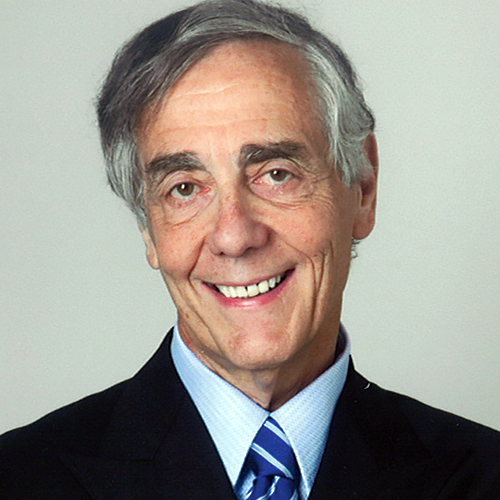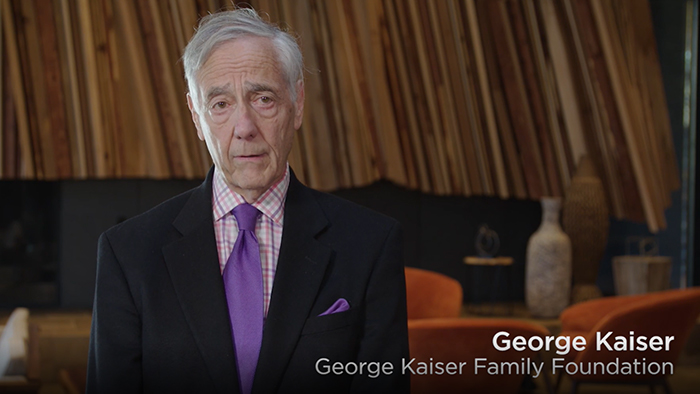
George B. Kaiser
I had the advantage of both genetics (winning the ‘ovarian lottery’) and upbringing. As I looked around at those who did not have these advantages, it became clear to me that I had a moral obligation to direct my resources to help repair that inequity."
Pledge letter
July 26, 2010
I suppose I arrived at my charitable commitment largely through guilt. I recognized early on, that my good fortune was not due to superior personal character or initiative so much as it was to dumb luck. I was blessed to be born in an advanced society with caring parents. So, I had the advantage of both genetics (winning the “ovarian lottery”) and upbringing. As I looked around at those who did not have these advantages, it became clear to me that I had a moral obligation to direct my resources to help repair that inequity.
America’s “social contract” is equal opportunity. It is the most fundamental principle in our founding documents and it is what originally distinguished us from the old Europe. Yet, we have failed in achieving that seminal goal; in fact, we have lost ground in recent years. Another distinctly American principle is a shared partnership between the public and private sectors to foster the public good. So, if the democratically-directed public sector is shirking, to some degree, its responsibility to level the playing field, more of that role must shift to the private sector.
As I addressed my charitable purposes, all of those conclusions seemed pretty clear: I was only peripherally responsible for my own good fortune; I was morally bound to help those left behind by the accident of birth; America’s root principle was equal opportunity but we were far from achieving it. What was left was to identify the charitable interventions most likely to advance that purpose.
Recent discoveries from stem cell and brain development research, using medical diagnostic tools, provided some guidance for me. Though almost all of us grew up believing in the concept of equal opportunity, most of us simultaneously carried the unspoken and inconsistent “dirty little secret” that genetics drove much of accomplishment so that equality was not achievable. What the new research seemed to suggest, however, was that brain cells were functionally unformed at birth and that only through the communication among them—driven by trial and error interpretation of sensory stimulation shortly after birth—did our cognitive and social/emotional skills develop. As I sometimes joke, I remember vividly that place before birth as being warm, wet, dark…and boring. Then, suddenly, as I emerged, I was bombarded with sensory overload and had to interpret all of that strange stimulus. Most of that interpretation takes place by age three; after that, we can modify our destiny but it is a lot harder.
No child is responsible for the circumstances of her birth and should not be punished for them in this life. (I will leave the question of second chances to other pulpits.) I have therefore developed my charitable focus around the concept of providing the greatest opportunity for self fulfillment for each child, focusing on those who arrive in the least advantaged circumstances. (A purer focus would be in areas of much greater disadvantage in the world where fewer dollars accomplish more. I honor the Bill & Melinda Gates Foundation’s commitment to the principle that “every life has equal value” but will leave my justification for a primarily American focus to another dissertation.)
That governing concept has led me to those initiatives which attempt to reverse the generational cycle of poverty, especially for very young children and their families: prenatal and family healthcare; early learning and development for at-risk kids, birth to three; teen pregnancy prevention; parenting skill development; job and income assistance for families with young children; a robust program to provide alternatives to incarceration for mothers who have committed non-violent crimes, et cetera.
These efforts focus most heavily on the causes of poverty but we also dedicate resources to the symptoms, especially in these difficult times and in our relatively poor part of the country—food, clothing, shelter, healthcare and civic projects that promote inclusiveness and vibrancy. We generate a mix of projects, some of which are leading edge and more that import best practices from the greater creativity and experience of others. We attempt to leverage other resources, public and private, by our example. We try not to let a budget drive our expenditures but rather pursue those efforts through which we can make a true difference at an appropriate cost, whether less than or more than our targeted allocation. We remain lean in our central organization and partner with the leading practitioners in our fields of endeavor. We tend to direct our purposes and carefully monitor targeted results on a contemporaneous basis rather than scattering gifts and trusting to retrospective general narratives of success from the beneficiaries. All in all, it is an intoxicating and yet frustrating journey, led by an extraordinarily committed and talented cadre of leaders.
Now that I have told you far more than you wanted to know about how I arrived at my charitable commitment and direction, it is time to make the pledge: I am entranced by Warren’s and Bill’s visionary appeal to those who have accumulated unconscionable resources, to dedicate at least half of them back to purposes more useful than dynastic perpetuation. My family is very well provided for and they join me in my commitment to devote virtually all of my financial resources to the same general charitable purposes I have pursued in life, better informed in specifics by our experience and the experience of others. If enough acolytes follow Bill’s and Melinda’s and Warren’s example, then maybe we will more closely approach the ideal of equal opportunity throughout the United States and the world.


